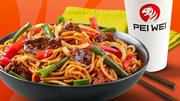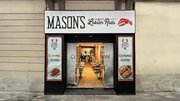Article
Going global: Is your brand ready?
Restaurant execs share the dos and don'ts of expanding internationally.

February 27, 2014 by Cherryh Cansler — Editor, FastCasual.com
When to take a franchise global is probably one of the most difficult questions for restaurant owners to answer, but a couple sessions this week at the International Franchising Association convention aimed to help buisness owners with the decision.
Three restaurant executives with global success discussed several best practices when it came to deciding when and where to stake international claims. The experts included: Adam Scott, cofounder and COO of Wingzone; Dan Stone, CFE, VP of Franchise Development of Front Burner Brands, which owns The Melting Pot and Burger 21; and Kurt Ullman, CFE, VP of Global Development for Planet Smoothie and Tasti D-Lite.
The men agreed that if done correctly, going global has many perks, including providing new sources of revenue such as initial license fees, unit franchise fees and royalties and making brands less dependent on home markets. Ullman also pointed out that it can lead to an increase of brand value for stakeholders.
Those benefits are reaped, however, only when a company makes a wise decision regarding when and where to expand. Simply moving into a country where a competitor is already operating isn't enough, said Scott. It's also not enough to look at a country's overall economics, even if they are growing. Many of the people making up the population won't be in a position to spend money on you, no matter how much you target them.
"You can't look at the entire population," Scott said. "You only care about who can afford you."
Adapting to new markets and cultures
It's important to learn as much as possible about any country where you want to do business, said Stone, who believes that conducting "in-market due diligence visits" prior to executing final agreements is a must.
It's not enough to just take the franchisee candidate's word for it; you have to validate what they have shared with you about the culture. While visiting, Stone said to tour and study the differences in the other American brands already operating there.
When Wingstop first went global, Scott hired an expert in international franchising and recommends the same strategy for other brands. It worked for Wingstop, which now has more than 600 restaurants around the world and recently signed a deal to open 50 units in the Philippines.
"I can't imagine doing that alone," he said. "He knew all the numbers; he knew the questions to ask; he had taken brands to other countries."
Balancing Americanization
While it's important to respect cultures, it's also it's imperative to stay true to your brand wherever possible, Stone said. Disneyland Paris made that mistake when it opened with French-only food on the menu. Customers not only expected but demanded American food, Stone said, and Disney quickly switched gears and gave them what they wanted.
"There is a strong desire for the American concept 'as is', not a loosely inspired version for another country," he said.
Sometimes compromises must often be made, however. For example, The Melting Pot is not open for lunch in the U.S., but that's not the case in Mexico, where the long-lunch siesta is the country's most popular meal. The décor is different, too. The bright purples and fuchsias would not fly in the States, but it's perfect for the Mexican culture. Even the food is a bit different; the brand had to invent a spicy sauce specifically for the Mexican market since customers there expect bolder, hotter flavors, Stone said.
Other changes were necessary for the brand to succeed in Saudi Arabia. For example, the brand had to change its cheese recipe because of the country's alcohol ban. Normally, the cheese fondue has a beer base, but that was off limits in the Middle East.
Since alcoholic beverages and the wine display are a big part of The Melting Pot's image, Stone said it was important for it to showcase that in another way.
"We have a large 'mocktail' menu, and that's very popular there," he said.
Cover photo: Courtesy of Wikipedia
 ChatGPT
ChatGPT Grok
Grok Perplexity
Perplexity Claude
Claude












